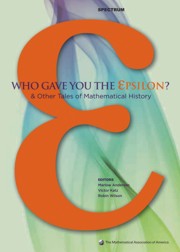Book contents
- Frontmatter
- Introduction
- Contents
- Analysis
- Geometry, Topology and Foundations
- Algebra and Number Theory
- Surveys
- Foreword
- The International Congress of Mathematicians
- A Popular Account of some New Fields of Thought in Mathematics
- A Half-century of Mathematics
- Mathematics at the Turn of the Millennium
- Afterword
- Index
- About the Editors
A Half-century of Mathematics
from Surveys
- Frontmatter
- Introduction
- Contents
- Analysis
- Geometry, Topology and Foundations
- Algebra and Number Theory
- Surveys
- Foreword
- The International Congress of Mathematicians
- A Popular Account of some New Fields of Thought in Mathematics
- A Half-century of Mathematics
- Mathematics at the Turn of the Millennium
- Afterword
- Index
- About the Editors
Summary
Introduction. Axiomatics
Mathematics, beside astronomy, is the oldest of all sciences. Without the concepts, methods and results found and developed by previous generations right down to Greek antiquity, one cannot understand either the aims or the achievements of mathematics in the last fifty years. Mathematics has been called the science of the infinite; indeed, the mathematician invents finite constructions by which questions are decided that by their very nature refer to the infinite. That is his glory. Kierkegaard once said religion deals with what concerns man unconditionally. In contrast (but with equal exaggeration) one may say that mathematics talks about the things which are of no concern at all to man. Mathematics has the inhuman quality of starlight, brilliant and sharp, but cold.
But it seems an irony of creation that man's mind knows how to handle things the better the farther removed they are from the center of his existence. Thus we are cleverest where knowledge matters least: in mathematics, especially in number theory. There is nothing in any other science that, in subtlety and complexity, could compare even remotely with such mathematical theories as for instance that of algebraic class fields. Whereas physics in its development since the turn of the century resembles a mighty stream rushing on in one direction, mathematics is more like the Nile delta, its waters fanning out in all directions. In view of all this—dependence on a long past, other-worldliness, intricacy, and diversity—it seems an almost hopeless task to give a non-esoteric account of what mathematicians have done during the last fifty years.
- Type
- Chapter
- Information
- Who Gave You the Epsilon?And Other Tales of Mathematical History, pp. 391 - 410Publisher: Mathematical Association of AmericaPrint publication year: 2009

